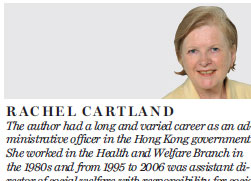Life today in Hong Kong is better than many realize
Updated: 2016-03-16 08:11
By Rachel Cartland(HK Edition)
|
|||||||||
For some in Hong Kong the colonial era has become bathed in a rosy, nostalgic glow. Those who cannot remember it may be amazed to learn that in those days the government was subject to protests, complaints and criticism, much of it justifiable. All the same, as a civil servant then, I often used to wish for a magic machine that could transport the entire population of Hong Kong to some other countries so they could see we really were not doing such a bad job at all by comparison. The usefulness of such a machine has not disappeared, so I mused as I contemplated Financial Secretary John Tsang Chun-wah's recent Budget. In the run-up to its revelations we had an entirely reasonable expectation that we would not be confronted by terrifying new taxes, fees or charges; there was instead much discussion of the best things on which to spend the predicted surplus adding to the already enormous reserves.
We in Hong Kong tend to be "glass half empty people", focusing on the faults and neglecting to appreciate the many good things about our great city. Suppose, then, that a group of overseas visitors from a developed country had turned up here in the days leading to this latest Budget. They would have witnessed not only the almost incredibly rosy state of our public finances but also negligible unemployment rates. They would have experienced one of the world's best transport systems and enjoyed varied and vibrant nightlife without fear of crime or delinquent behavior spoiling their evening out. They would be among people whose lives are enriched by more freedom than almost anywhere else in the region and who have access to a range of welfare benefits and schools and universities which score remarkably well in official international comparison tables. Most Hong Kong people will be up in arms at this description, falling over themselves to point out all their city's flaws, imperfections and problems - many of our own making.
Most of these problems are political rather than economic, or usually happen only at the point of political and economic overlap. A sign of this is the amount of press attention given to the "political" aspects of the financial secretary's speech - the remarks related to social cohesion, and the conciliatory and pro-Hong Kong tone. Our desperate hunger for solutions for our community's woes is indicated by the enthusiasm and attention with which Tsang's relatively bland remarks were greeted. This upsurge of hope says much for Hong Kong's essential resilience although also its volatility, its readiness to jump on a likely-looking bandwagon.
What is it that needs to be done? The prescription is surely straightforward even if difficult to administer. The overall aim should be that we do not have to suffer again worrying social upheaval like the riots that marred this year's Chinese New Year Day.
First, our police should be taking a critical look at what went on and where they will need to do better. Both the "fishball riot" and the "Occupy" movement of 2014 seemed, to an alarming extent, to come as a surprise to the forces of law and order. I do not mind if it is done in private so long as it is done, but the police should surely be reviewing their sources of intelligence, the importance of social media in starting riot situations and then inflaming them, as well as the actual tactics that they use once violence is upon them. When it comes to the last of these, I would hope that they would take into account the sensible suggestions recently put forward by Nigel Collett on these pages.
Second, we need to listen to our younger generation. There is much talk about what was done after the disturbances of 1966 and 1967. The city district offices were a major innovation but the youthfulness of the city district officers themselves is sometimes overlooked. These young people were energized by a mission to understand the needs, aspirations and grievances, both significant and trivial, of the communities in which they served.
Finally, we need to find solutions. It is hard to believe that some want to find excuses for the injuries and damage inflicted in Mong Kok. We all know that the history of modern Hong Kong is a miracle of achievements despite the absence of resources - save for our resilience and elbow grease. Surely it is not beyond us to achieve as much again so that instead of saying "It isn't all bad" the assessment of our city becomes "It's really pretty good".

(HK Edition 03/16/2016 page12)